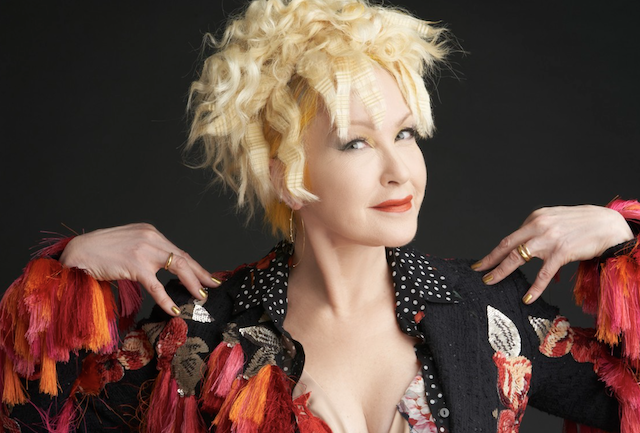
Let the Canary Sing : Chronicling Cyndi Lauper’s meteoric ascent to stardom and her profound impact on generations through her music, ever-evolving punk style, unwavering feminism, and tireless advocacy. The film takes the audience on an engaging exploration of the world of a renowned and pioneering artist, who has left a remarkable legacy with her artwork.
Director : Alison Ellwood
Producer : Alison Ellwood, Trevor Birney, Eimhear O’Neill, Andrew Tully, Tom Mackay, Richard Story, Rebecca Teitel, Sophia Dilley, Wesley Adams, Lisa Barbaris, Gregory P. Cimino
Distributor : Paramount+
Production Co : Sony Music Entertainment, Fine Point Films, Concord Films
Genre : Documentary, Music, Biography
Original Language : English
Release Date (Streaming) :Jun 4, 2024
Runtime :1h 36m
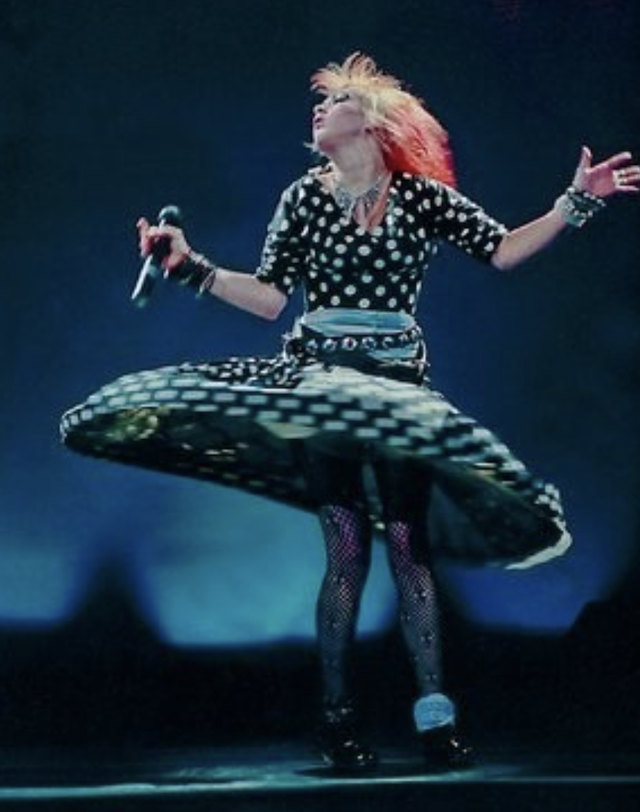
A still of Cyndi Lauper featured in Let The Canary Sing, streaming on Paramount+, 2024. Photo Credit: Laurie Paladino/Paramount+
Exclusive Interview with Director Alison Ellwood
Q: How did you get to tackle one of the greatest singers of our time in the first place? Could you tell me how it got started?
Alison Ellwood: We were at Sundance in 2019 with The Go-Go’s film and Belinda Carlisle was talking to Eimhear O’Neill, one of the producers from Fine Point on this film. They were talking about what a great film Cyndi Lauper’s story would make. Belinda and Eimhear put us in touch with Cyndi and they started talking and then of course COVID hit. So things got delayed for a year and a half or two.
Then Cyndi and I started talking via zoom during COVID and just getting to know one another. Initially, she was reluctant to do it. She said, “I’m not dead yet. Who needs a documentary about me?” I kept saying, “It’s a great story and the music’s great. You’re beloved by your fans and you should get to experience that yourself. it’ll be a really powerful piece.” She finally agreed. We got to know each other and then it was completely forthcoming.
Q: It was a quite different sound that Cyndi made when she did a cassette tape and sent it to Katie Agresta, her voice coach at the time. Her voice was quite different because of drugs and what she was doing back then. Cyndi had an abusive relationship with her stepdad and took a year off for her voice to recover.] It was surprising that Katie was able to hear her talent back then with that voice.
Alison Ellwood: She was trying to emulate Janis Joplin back then. What she realized is that she had to find her own voice. That’s what Katie helped her discover. Don’t emulate other people, but sing, let your voice be the song. That’s what they worked on a lot. She had a lot of vocal damage because of trying to sing in that [guttural] way. Katie helped her recover and she found her own voice.
Q: Speaking of her own voice, she started writing her own lyrics and music, and worked with John Turi to create a band, Blue Angel. Talk about her collaboration with Turi back then. Even though they didn’t have as much success, they tried out different aspects of music back then.
Alison Ellwood: It was a great band. The music was amazing. Some of the songs they wrote were spectacular cries of “I’m going to be strong,” and they’re just beautiful songs. She stuck with them for a long time and believed in them but, for whatever reason, they just didn’t get over that edge. That happens sometimes and it’s sad, but Cindy continued to work with John and they’ve worked together ever since. But she realized she had to go off on her own and let her voice be heard.
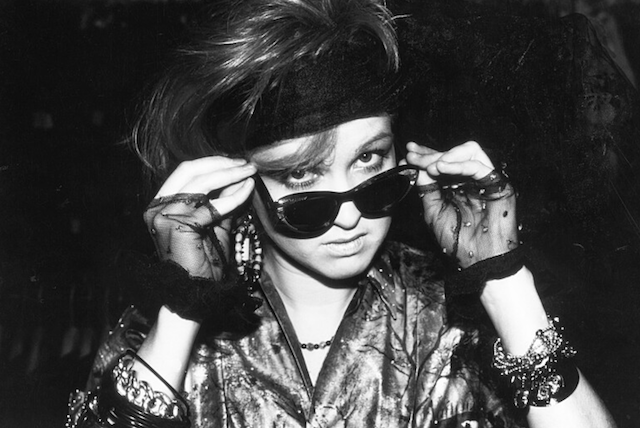
A still of Cyndi Lauper featured in Let The Canary Sing, streaming on Paramount+, 2024. Photo Credit: Laurie Paladino/Paramount+
Q: Cyndi used to work in one of those Japanese nightclubs or bars to support herself back then. Those places often supported artists and gave them food when they performed there. Isn’t that true?
Alison Ellwood: Yeah, she worked in a bunch of places. You do cover songs, and I think she tried to be a waitress there. Then she was fired from that job. I think she started doing some singing then. I can’t remember what else she was doing, but it’s true. She held a lot of odd jobs for a long time trying to make it.
Q: What’s amazing about her relationship with her one time manager David Wolff is that, obviously, he hooked her up with Portrait Records. Then she had four Top 5 songs in the U.S. But soon after that, they broke up — they fought constantly. Talk about their relationship back then. They had a great chemistry, but at the same time, creative differences caused problems.
Alison Ellwood: As she says in the film, we promised each other that the business wouldn’t get in the way, but the business always got in the way. There were so many demands being put on them and they started to have disagreements about the direction to go in.
It just was sad that the relationship didn’t last, they did help each other get to a place that was pretty amazing. He’s no dummy, that guy he was equally responsible for the wrestling connection, which everyone thought they were crazy at the time, but it ended up being a brilliant marketing move and got her on the map.
Q: It’s surprising watching this documentary, that these days, her voice will get her hits, but why did she take so much time to become who she is now? The men were trying to make her somebody else instead of what she wanted to be. Talk about how she struggled to actually become who she is now?
Alison Ellwood: I guess at the time, she first started doing covers. She had to discover her own voice, which she did with Blue Angel. The voice was just extraordinary and that was always cutting through. People kept saying we like you, but, for whatever reason, the band wasn’t clicking for people.
People at the time didn’t get beyond the one record. People kept saying, we want you to be this or be Barbara Streisand osr this. As a solo artist, you get people to label you and she didn’t want to be labeled. “I’m who I am. My voice is unique.”
But in discovering her own voice, she just persevered until people would listen. Finally she broke through, but she was nearly 30 by the time she hit it big. I think most people think she was in her early 20s. She looked so young and sounded so young.
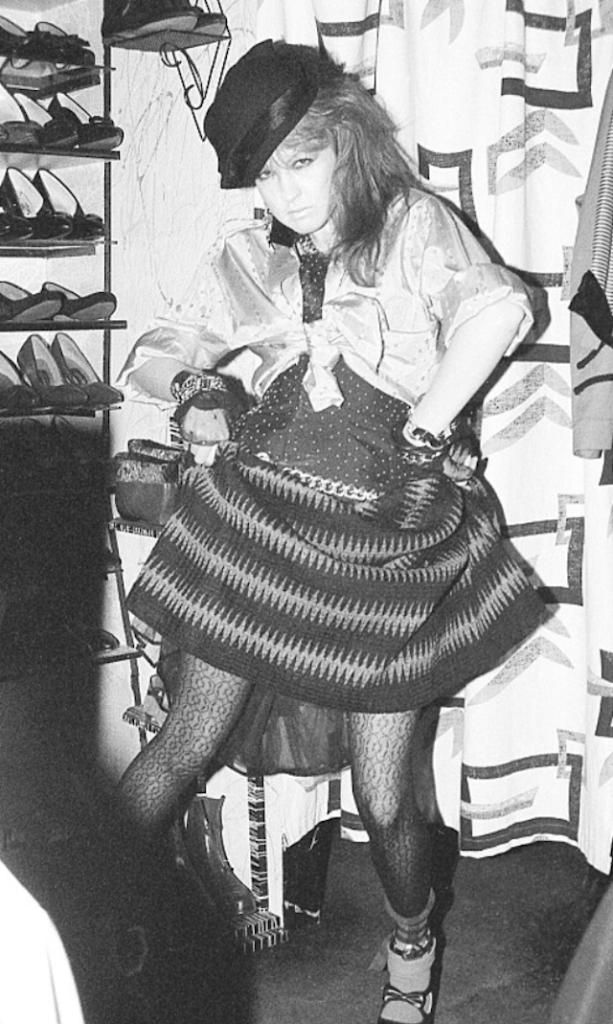
©A still of Cyndi Lauper featured in Let The Canary Sing, streaming on Paramount+, 2024. Photo Credit: Laurie Paladino/Paramount+
Q: Talk about her making “Girls Just Wanna Have Fun,” because it just comes all together with the team that they had at the time. The process of making the music took such a long time because she wanted to have a girl’s voice instead of a man’s one. Cyndi found the original lyrics to be misogynistic.
Alison Ellwood: Initially, when she was taken to hear Bob Hazard [Robert Hazard, the original songwriter/singer for “Girls Just Want Have Fun], do the song live in Philadelphia, she said, “I will never do that fucking song.” She didn’t like it, it didn’t speak to her, but they kept saying,”Just give it another try, give it another try.”
They started working on it in the studio. They just kept working on it and she finally found her voice. Then it became hers and then she shared it. It’s an anthem for girls and women, An empowering song.
Q: What’s surprising about her relationship with her sister, Ellen, and her involvement with the LGBTQ people, is that she started off very young to accept LGBTQ folks at an early age. In a way, she discovered herself through those communities, don’t you think?
Alison Ellwood: From an early age, she was very accepting. As her sister Ellen says in the film, she just sees things differently than most people. She doesn’t judge, she’s very accepting, warm hearted, and understands people who are underdogs.
She reaches out and wants to help them elevate themselves, too. She’s just been a feminist and an advocate for others, always. I’m sure as a young kid, she didn’t put up with stuff that was thrown her way. She fought for herself and others. It’s an important part of who she is and what her music is.
Q: Her creativity is very cutting edge. She brings a new perspective through her collaboration with Annie Leibovitz in making a creative music video that’s cutting edge. Talk about her perspective on working with photographers or filmmakers.
Alison Ellwood: She’s a very visual person. She thinks in terms of visualizing things. She has very strong ideas of what, and how she wants her music to sound and what it should be, what her look should be, what the look of the videos should be. She loves collaborating with people and understands the different people she was collaborating with who have different talents that she could bounce ideas off of.
She was always very involved in that. It’s very important to her. Her message is important. Her look is important. And, the videos were groundbreaking at the time. They were very different. They were super fun, too, but also with messages, sometimes more subtle than other times.
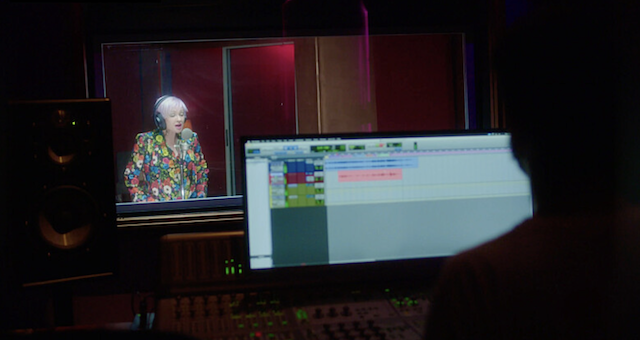
©Cyndi Lauper in Let The Canary Sing, streaming on Paramount+, 2024. Photo Credit: Sony Music Entertainment/Paramount+
Q: This documentary has such a vast range of archival footage. Talk about gathering all that footage, particularly when she was in the Blue Angel stage, it was probably hard to get all that together.
Alison Ellwood: Susan Johnson was our archival producer and she did an amazing job digging stuff up. But Cyndi and Lisa — Barbara is her manager — they also had cataloged a lot of her interviews, videos and different things that were done around the world. There was some home video stuff as well.
They gave us a huge amount of material to begin with, and then Susan would track it and find out where we license it and then, in finding where we license it, we would find new things that we could use. But when we discovered that Blue Angel footage when she’s singing, “I’m Gonna be Strong,” that just blew us away. Her voice is so powerful. There was a huge amount of amazing archival material to work with. We were very lucky.
Q: She visits Japan often and sent a charity donation for the Hanshin Earthquake. She attended NHK’s Kōhaku Uta Gassen [An annual New Year’s Eve television special produced by Japanese public broadcaster NHK, which is a very popular Japanese TV program that runs on December 31st]. Talk about her relationship with Japanese culture and its influence?
Alison Ellwood: I can’t speak too much directly to that. but I know she has been to Japan many times and loves it there. She loves the people and the culture. I can’t really speak exactly to what appeals to her in that respect but she loved being there. She went there frequently and will be on her big tour soon.
Q: Cyndi had her first kid when she was 44 years old. Has that changed her working stance and does it require a lot of care to do so at the same time?
Alison Ellwood: She kept working, I think, when she was pregnant. She did the album “Sisters of Avalon” and one of the music videos for the four sisters of Avalon. I think she was pregnant at that stage. But working has always been really important to her and she continued to do so. Obviously, she took time off since family is very important to her as well. She’s had to balance it. David, her husband, has been very helpful with that, of course. Family is always huge for her. Exactly how she balances it, I don’t know, but she does. She manages.
If you like the article, share your thoughts below!
Check out more of Nobuhiro’s articles.
Here’s the trailer of the film.

